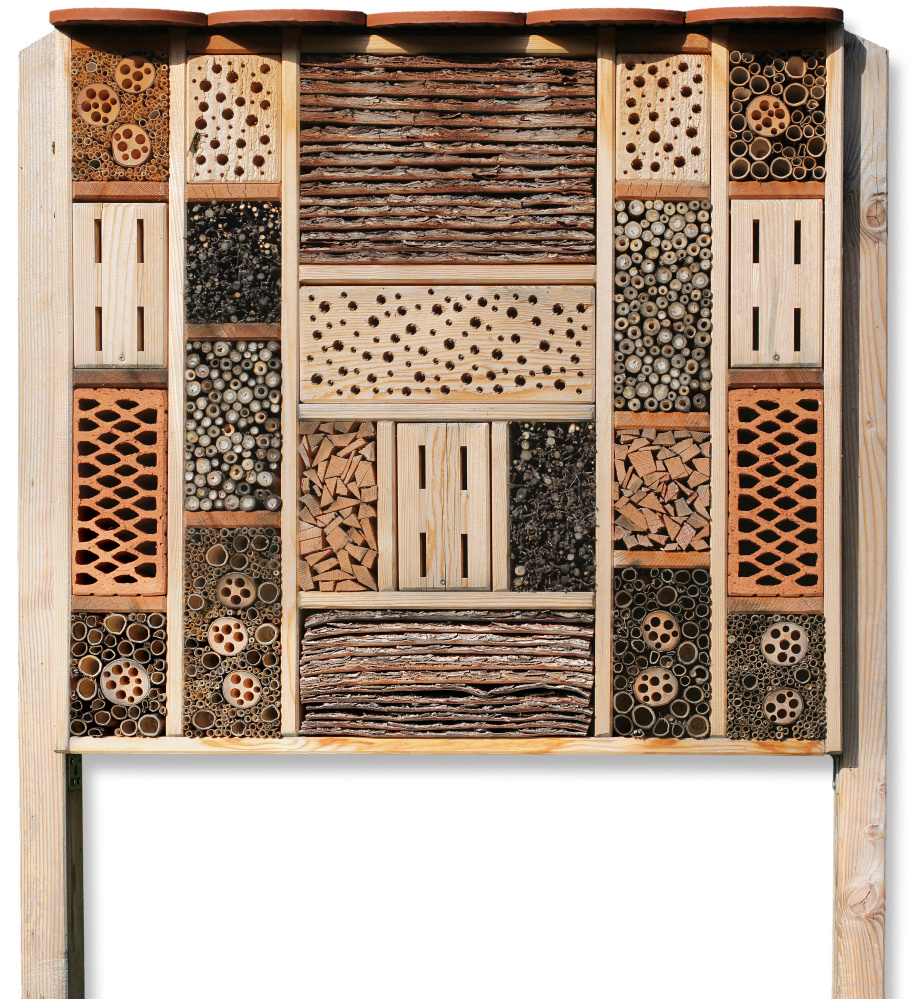The gift-giving holidays – Christmas, Hanukkah, Kwanzaa, winter solstice and Dec. 23, which is both Festivus and my son Zachary’s birthday – lead gardeners into the time of the year when they can’t do a lot of gardening – at least in these northern parts.
So, what you want to give them is something to do, a few projects that fulfill their compulsion to garden until they can start planting seedlings in February or the garden itself in April.
The need to provide habitat for pollinators such as native bees and butterflies has become more important as the honeybee population seriously declines. Consider giving habitat for those vital insects.
If the recipient is a do-it-yourself sort, wrap up material – basically 2-by-6-inch lumber and 1-by-3-inch strapping – to build some bee houses and print out the University of Maine Cooperative Extension bulletin No. 7153 (umaine.edu/publications/7153e) on native bees, which includes instructions for building the houses.
Others on your list may prefer a ready-made, spiffier-looking bee house. The Gardener’s Supply Company sells a good-looking woven bamboo bee house for $20. The company offers similar shelters for butterflies and birds at the same price. And for $40, it has a habitat hotel that provides shelter for butterflies, native bees and beneficial, pest-eating insects such as ladybugs and lacewings.
You can always give a gardener a houseplant as a gift, but it’s hard to know which one. Orchids are an obvious choice – especially if you buy them with buds instead of, or in addition to, full blossoms. That way, even if the recipient fails to get the orchid to rebloom, the plants are attractive for longer. OK, admittedly orchids, at least the easy sort, aren’t too big of a project. But you always could get your gardening friend a terrarium.
I’ve noticed a resurgence of kits for terrariums this year, both at garden centers and in gardening catalogs. They vary a lot, from simple blown-glass balls with a hole for watering plants that start at about $25, to jars with removable covers and even one, for $169 from White Flower Farm in Morris, Connecticut, that looks like a miniature Victorian pavilion. They come with tropical plants, potting soil, pebbles and sand, along with the glass and metal house. Putting the terrarium together is like designing and planting a small garden, and it’ll keep pining-for-spring gardeners entertained.
Gifts that’ll be useful once gardening resumes in the spring will be appreciated, too.
Pinetree Garden Seeds (superseeds.com), a catalog company in New Gloucester, has several season-extending products at reasonable prices.
One is a garden cold frame with a raised bed, tubular steel frame and roll-up zippered panels for easy access. It’s 47 by 24 inches, so could be used on patios and balconies. At $40, it costs much less than most other purchased cold frames.
If you’d like to give a more generous gift, consider Pinetree’s walk-in greenhouse for $140. It’s more than 6 feet tall and 4 feet by 6 on the ground, with a roll-up door and two tiers of shelving.
While you are on Pinetree’s website, check out my favorite low-price stocking stuffer. To explain this, a confession: I often lose things in the garden. After I lost my third $50 Felco hand pruner, I vowed never again. Pinetree sells a $6.95 hand pruner that cuts very well. I used one all summer, and it held up. Even though the red-coated grip came off my first one, it still does the job, so I bought four more, in case I lose them and/or Pinetree stops selling them. But somehow I suspect that since I spent so little on them, I won’t lose these. Anyhow, if you know a similarly absentminded gardener, I suggest the pruner.
Back to raised beds for patios and decks: For a gift on the ornamental side, check out the VegTrug, available on several websites including Amazon and gardeners.com for $279, and solidly made of wood. Add a greenhouse cover and micro-mesh insect cover, and the total comes to $339. A smaller version for children costs $115.
My wife, Nancy, and I inherited two terrific garden hoes from her grandparents, and for years I’ve wondered how people work with the clunky hoes I see at hardware stores. But while perusing the website for Johnny’s Selected Seeds recently, I saw several hoes that would work as well as ours. One, a narrow collinear hoe, with a 3 ¾-inch blade, looks like it would work effectively around the plants; Johnny’s sells other collinear hoes with blades up to 7 inches.
Or give your favorite gardener a stirrup hoe, $51 at Johnny’s and similar to the hula hoe we bought several years ago and that has proved invaluable.
If none of these ideas strikes your fancy, buy a gift certificate to a garden center near the recipient’s home. The center’s staff can provide advice on which plants grow best in the area and which tools work best. So in addition to whatever items your friend or family member buys with her certificate, she’ll receive sound knowledge and advice – and that is often the best gift of all.
Tom Atwell has been writing the Maine Gardener column since 2004. He is a freelance writer gardening in Cape Elizabeth and can be contacted at 767-2297 or at tomatwell@me.com.
Send questions/comments to the editors.



Success. Please wait for the page to reload. If the page does not reload within 5 seconds, please refresh the page.
Enter your email and password to access comments.
Hi, to comment on stories you must . This profile is in addition to your subscription and website login.
Already have a commenting profile? .
Invalid username/password.
Please check your email to confirm and complete your registration.
Only subscribers are eligible to post comments. Please subscribe or login first for digital access. Here’s why.
Use the form below to reset your password. When you've submitted your account email, we will send an email with a reset code.